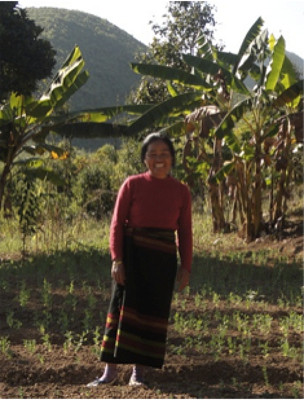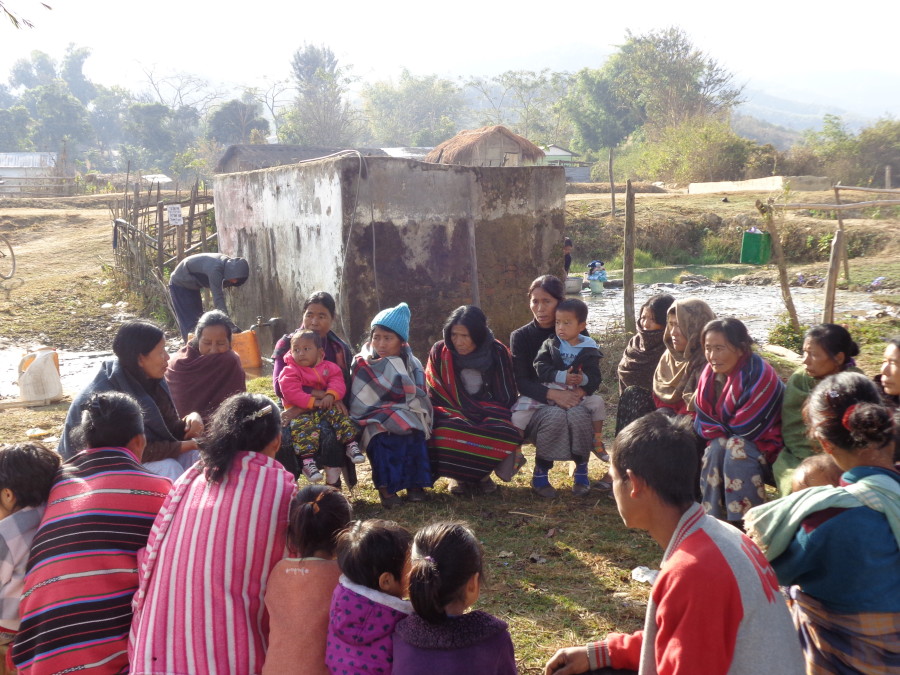Protecting Forest Livelihoods and Biodiversity in the Face of Climate Change
By: Katie Douglas, WEA Intern
“Each time I plant a tree I realize that I am not only contributing in a small way to sustain the livelihood of forest dependents like me, but also toward [addressing] global warming.”

After learning about the impacts of forest degradation, Sangpui committed to personally plant over 1,000 banana saplings. Photo: RWUS
In the northeastern state of Manipur, India, Sangpui is a mother of three, and raises her children on the little income she earns from growing vegetables, and selling forest food items to local markets. Though her actions may seem small, they are part of a larger and incredibly significant global movement. For her part in this movement Sangpui refuses to be a powerless victim of climate change, and instead has established herself as an active participant in sustainable change.
Sangpui’s determination to create change for herself and her community is reflected in her actions and her participation in the Rural Women Upliftment Society’s (RWUS) climate training. This partnership between RWUS and WEA supports the local women of Manipur by addressing issues of natural resource management, gender inequality, environmental degradation and climate change at local and policy levels.
RWUS tackles these issues with trainings that provide women with the resources to become voices of change and sustainable development within their communities. As massive developments and national deforestation programs challenge the wellbeing of Bangladesh’s lands and rivers, traditional female knowledge represents the key to climate mitigation and conservation.
Manipur is regarded as one of the most ecologically sensitive regions in the world, but in recent decades this beautiful land has experienced widespread deforestation with 38% of the state’s land seeing rapid forest cover change. This has resulted in agricultural challenges, and water and food insecurity. Severe droughts have led health officials to fear for increased levels of water-borne diseases as people increasingly drink from impure and contaminated water sources.

Photo: RWUS
Sangpui and the other women of Manipur’s tribal communities represent the primary food providers, water collectors, and economic contributors. This means that these unsustainable developments have affected their lives the most. And without empowered female figures to raise these issues, either in their traditional societies or around government resource management, those with the most information to bring to the environmental discussion are left with no way to contribute their knowledge.
RWUS trainings are a critical element in tackling Manipur’s local issues of gender and environmental injustice. Through awareness-raising workshops on climate change and female leadership, grassroots environmental campaigning, and tree planting days, the women who were once vulnerable can take a proactive role in addressing issues of environmental degradation. As community leaders these women can work to improve the effectiveness of initiatives around climate change adaptation. Example workshops may focus on increasing awareness around forest biodiversity, sustainably managing natural resources and giving the women the capacity to address emerging issues of dams and mining. This provides the women with the critical opportunity to discuss how these destructive developments have impacted their Indigenous livelihoods, culture and general existence.

An RWUS orientation around impact assessment as part of a training program. Photo: RWUS
Today Sangpui continues to work on how to take personal responsibility in protecting her local environment. In fact, learning about the impacts of forest degradation led her to personally plant over 1,000 saplings. Just as in WEA’s vision, she is literally sowing her seeds of knowledge in the hope of creating for herself and her community a more sustainable future.
